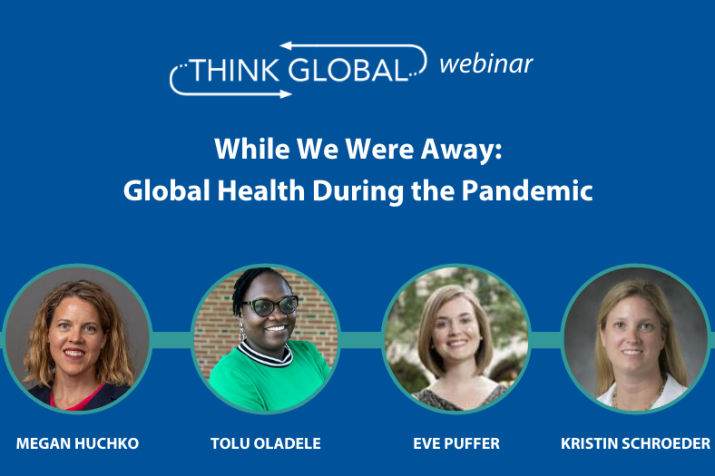The issues global health researchers worry about have not gone away during the COVID-19 pandemic, and in many cases, they have gotten worse.
Four global health experts recently discussed the challenges of preventing and treating diseases such as cancer, HIV/AIDS and mental illnesses during a pandemic, as well as newly emerging problems caused by the pandemic and lockdowns. The event, which took place on Thursday, Oct. 8, was part of the Duke Global Health Institute’s Think Global webinar series. Watch the webinar below, or scroll down to read highlights from the conversation.
Watch DGHI's Think Global webinar on...
On the effect of the pandemic on research and intervention for other health issues
Kristin Schroeder, assistant professor in pediatric hematology and oncology, who runs a clinic for pediatric cancer patients in Tanzania:
“We had to drop our staff down to one person at a time in the office, and that had a significant impact, because this team is responsible for providing care for all new patients. There are about 200-220 new diagnoses a year, and so when we dropped down to one staff at a time, people were being missed. We weren’t finding the new diagnoses. There wasn’t time to do education, and so people were abandoning treatment.”
Megan Huchko, director of the DGHI Center for Global Reproductive Health, on the impact of COVID on her work on cervical cancer prevention in rural Kenya:
“I think at the beginning some of us thought, we’ll have to wait until after COVID. But COVID has had such a profound impact on the lives of people there and the way that services are delivered that we’ve taken this opportunity to see what the health infrastructure is going to look like now. How has this impacted care for the reproductive needs and cancer needs of patients there, and what can our team do to examine this and to work with partners to reimagine healthcare for the COVID era?”
Tolu Oladele, assistant director inNigeria’s National Agency for the Control of AIDS, on the impact of the pandemic on funding for HIV prevention and treatment in Nigeria:
“With COVID and the loss in revenue, what happened was that funding to the basic health provision fund was cut. There was need to move resources to infrastructure to support the COVID response. Many of the facilities we use for HIV services were now used as isolation centers, and many HIV labs now had to be used to run COVID samples, and this affected viral load testing within the country. We are lucky in that funding for HIV has not been cut, but we are teetering on the edge.”
Eve Puffer, assistant professor of psychology, neuroscience and global health, on the impact of lockdowns on mental health:
“Some of the pathways through which people get mental health care and support for their families have been very disrupted by COVID-19. It puts families in a bit of a pressure cooker, spending much more time together. It places children more at risk if their families are violent or if they are living in very harsh environments. There aren’t enough resources to support families, and there aren’t models of care that adhere to safety standards during COVID.”
On the effectiveness of countires’ COVID responses
Kristin Schroeder:
“Because there is such a strong public health infrastructure that has been developed through HIV, Ebola and the various public health crises that have come through, the moment that COVID was found (in Tanzania), things happened very quickly. We had massive education campaigns that went out. Hand washing stations popped up in the hospital overnight. There was mandatory masking. They took it incredibly seriously.”
On how COVID stigma impacts access to health care
Megan Huchko:
“Since the model of care has been so incredibly disrupted by COVID, clearly there are a lot of systems-level factors, such as clinic shutdowns and disruptions of services, that affect women’s ability to access the services. But now there is likely an overlying COVID-related stigma that is impacting people’s fear or willingness to go to get services.”
Tolu Oladele:
“With the fear of catching COVID, people weren’t willing to come to the facilities (to receive HIV treatment and testing). So what we needed to do was to find ways of reaching and making sure that people had access to their drugs. One of the strategies we deployed was a multi-month dispensary, where people were called in and given as much as three to six months of drugs.”
On the challenges of getting students involved in global research
Megan Huchko, on students not being able to travel to Kenya for a research project:
“It’s unfortunate, because people really want the cultural and travel aspect of doing their research. But our team has shown a lot of resilience, and research-wise they are continuing to produce.”
Eve Puffer:
“I’ve recognized how to be a more intentional mentor, because you lose a lot of the casual interactions.”
On the key lessons for global health researchers working during the pandemic
Kristin Schroeder:
“I feel a lot of guilt and difficulty when I’m not able to be present, when I’m not able to provide care to people and support my team. And I think what I’ve learned personally is that the team here has been really well trained. Even when I wasn’t here for five months, they were able to provide great care under the circumstances. They can stand on their own, and I’m really happy about that.”
Tolu Oladele:
“One good thing COVID has done for us in my workspace is for us to really embrace the use of technology. As a country, the private sector is ahead of the government in terms of leveraging technology, but with COVID, we’ve been forced to do it.”



